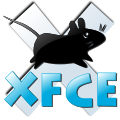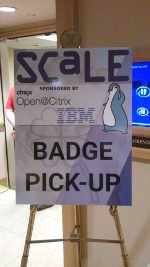There’s a scene in the movie “Apollo 13” where astronaut Jim Lovell (played by Tom Hanks) is excitedly rushing through the house after finding out he’s been picked to go to the moon on Apollo 13. His wife asks, “Why 13?” “It comes after 12,” Lovell replies without missing a beat.
For all the angst and trepidation that accompanied the fact that this is “unlucky” number 13 in the series of Southern California Linux Expo conferences, the show has gone forward in a relatively painless manner with only run-of-the-mill minor snags here and there.
Knock on wood. Throw table salt over your shoulder.








 I can say that, knock on wood, we have already had what I hope is going to be the only “black-cat-walking-under-the-ladder” glitch-of-the-show moment a couple of weeks ago when the idiot serving as the publicity chair — okay, that would be me — pulled the wrong list of speakers (the ones not chosen) to start doing speaker interviews with the Publicity Team. Thankfully, I found the error before any interviews were done, but it was a considerable amount of orchestrated work that was thrown out the window and redone with the right list.
I can say that, knock on wood, we have already had what I hope is going to be the only “black-cat-walking-under-the-ladder” glitch-of-the-show moment a couple of weeks ago when the idiot serving as the publicity chair — okay, that would be me — pulled the wrong list of speakers (the ones not chosen) to start doing speaker interviews with the Publicity Team. Thankfully, I found the error before any interviews were done, but it was a considerable amount of orchestrated work that was thrown out the window and redone with the right list.